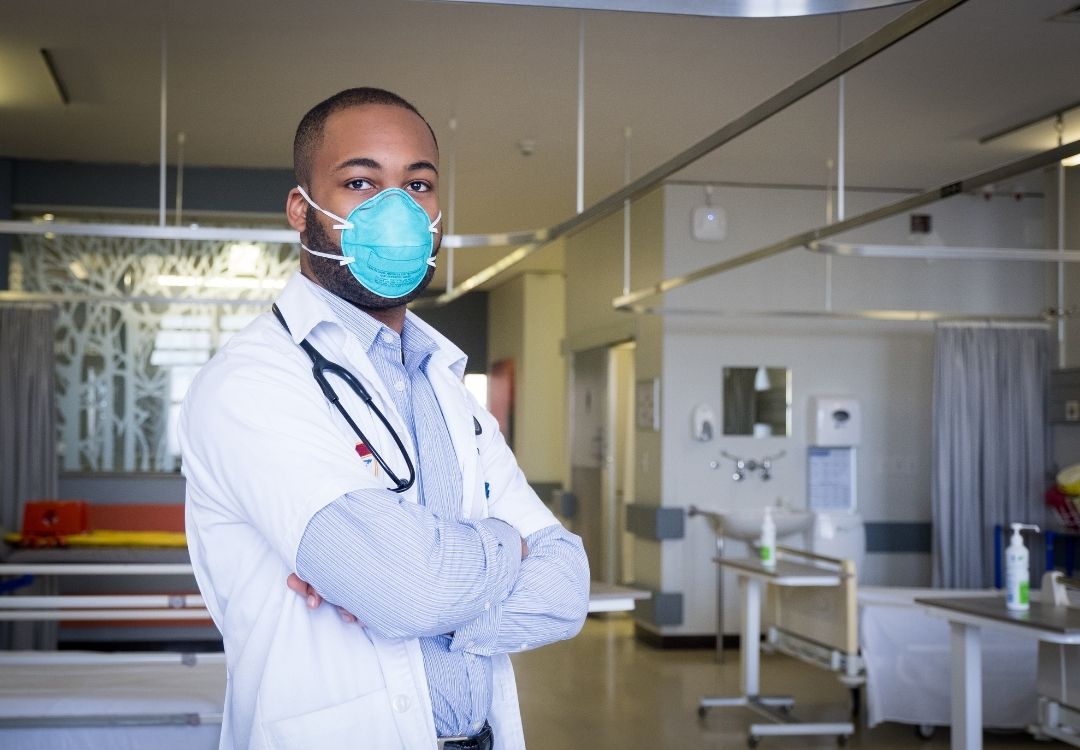Answering critical questions before an emergency happens
SHOPS Plus hosted a panel discussion on private sector engagement for health system resilience that brought together private and public sector representatives to discuss joint action. Kelly Saldana, Director of the Office of Health Systems, USAID, moderated the discussion. Representatives from two large corporates, one in telecommunications (Orange) and a medical technology firm producing oximeters (Masimo) shared their experiences along with the global health security agenda advisor at USAID/Senegal, which followed an overview of the SHOPS Plus strategic approach to health system resilience. The panelists were:
- James White, Clinical Advisor for the SHOPS Plus Project at Abt Associates
- Dr. Grant Aaron, Global Health Director at Masimo
- Philippe R. Mutwa, Global Health Security Agenda Advisor at USAID Senegal
- Ralph Ankri, Senior Project Manager, Business Development at Orange
A resilient health system can mitigate, adapt to, and recover from everyday stressors and larger, sudden shocks. Stressors, such as human resource shortages, and shocks, such as disease epidemics, can significantly strain health systems and lead to their collapse. Such a system is prepared to ensure an effective response to an emergency situation and the continuity of existing and emergent health needs. It takes many actors from the public and private sectors to participate in building a system’s resilience.

Saldana emphasized how USAID’s approach to health system resilience focuses on including the diverse talents, resources, and capacities of both the public and private sectors. “What do we need to do to make health systems both strong and resilient?” Saldana asked. Some responses included, empowering individuals in both public and private sectors for early action, making partnership processes and practices a part of preparedness planning, and ensuring rules and regulations are put in place before events occur that can focus on ensuring continuity of key health functions.
While there have been some initiatives to engage the private sector in health system resilience, such as through the Private Sector Roundtable on Global Health Security, lack of trust between the sectors and divergent terminology have made joint action difficult. Three main themes emerged from the discussion:
- The private sector can provide valuable, innovative, data driven, technology solutions before and during shock events
- Clearly communicating the abilities of the private sector and matching those to the needs of the public sector is a fundamental activity that will determine the success of partnerships
- Forging relationships and creating joint solutions well in advance will increase the impact private sector engagement can have on preparing health systems for future emergency scenarios.
James White outlined the strategic approach developed by the SHOPS Plus project for this purpose. The private sector has a crucial role in building the resilience of health systems, yet too often it is left out or engaged too late in efforts to prepare for and respond to stressors and shocks. The evidence-based approach guides USAID missions in engaging the private sector in health systems resilience efforts at any stage of preparedness or response. The approach provides specific recommendations for actors to take during both preparedness and response, highlights the need for diverse solutions for complex and diverse threats. White noted that late action and poor coordination are two of the biggest challenges that health systems face when emergency situations arise.
“We are typically reacting, not preparing. The more we can discuss in advance key questions of ‘who should be mobilized, where, when, with how much money, and for how long,’ the better prepared we are so that we aren’t trying to answer these questions in an emergency scenario.” James White, Senior Clinical Advisor, SHOPS Plus, Abt Associates
The panelists agreed that it is imperative to include the private sector in preparing for shocks. In his closing remarks, Ankri, of the telecommunications firm Orange, emphasized the need for a global mindset when acting on a local level and called for transparency and open communication between the public and private sectors.
Mutwa of USAID, shared how Senegal integrated the private sector into their COVID-19 response. This integration proved to be successful and Mutwa hoped that it would be a part of the process in building a resilient health system going forward.
Dr. Aaron from Masimo, emphasized the need to be prepared for future health crises, using the lessons learn from the COVID-19 pandemic. Echoing the words of White, he urged listeners to “embrace the chaos and be ready.”
With a whole community response, the approach signals the way for greater preparedness.
Watch the recording of Engaging the Private Sector in Health System Resilience Efforts.
Read the report Engaging the Private Sector in Health System Resilience Efforts here.